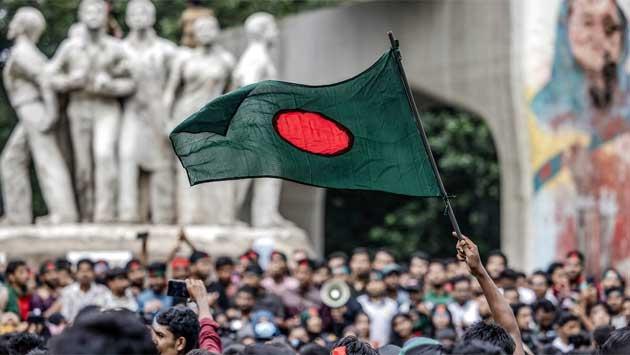24 Sep 2024 - {{hitsCtrl.values.hits}}
 The economic condition of Bangladesh is precarious, largely due to the legacy of the previous government, which has left the country burdened with foreign debt. Foreign exchange reserves have fallen to their lowest level in six years, currently at $16 billion, while remittances are below expectations. Additionally, there are numerous conspiracies aimed at undermining the interim government. The garment industry is also in turmoil, with extortion damaging its reputation.
The economic condition of Bangladesh is precarious, largely due to the legacy of the previous government, which has left the country burdened with foreign debt. Foreign exchange reserves have fallen to their lowest level in six years, currently at $16 billion, while remittances are below expectations. Additionally, there are numerous conspiracies aimed at undermining the interim government. The garment industry is also in turmoil, with extortion damaging its reputation.
Dr. Salehuddin, adviser to the Finance and Commerce Ministry, stated, "Apart from restoring law and order, the current economic situation is the biggest problem." The interim government's primary challenge is repaying substantial foreign loans, a situation exacerbated by dwindling reserves and the depreciating Taka, which has fallen from 86 to 120 against the US dollar.
Recent government data shows that Bangladesh owes $9.21 billion to Japan, $5.09 billion to Russia, $4.76 billion to China, and $1.02 billion to India. According to the Economic Relations Division (ERD), Bangladesh borrowed an additional $5.63 billion from July 2023 to March 2024, which Dr. Yunus is tasked with managing.
Russia has formally requested repayment of outstanding dues and interest on a loan for the Rooppur Nuclear Power Plant by September 15. Due to the expired deadline, arrears—including interest—have increased. The $12.65 billion loan for the Rooppur project carries a 4% interest rate, with an additional 2.4% penalty for arrears. In a letter dated August 21, Russia's financial development firm VEB.RF insisted that payments be made to the Shanghai branch of the Bank of China in US dollars or Chinese yuan. Failure to comply could complicate future negotiations regarding fines and extensions. The loan agreement expires in December, and Bangladesh’s proposals for alternative arrangements have been rejected.
China is also pressing for repayments. ERD Secretary Shahriar Kader Siddique confirmed that Bangladesh has requested a reduction in the interest rate on ongoing Chinese loans to 1% and an extension of the repayment period to 30 years. However, Beijing has not yet responded, and past experiences suggest China is unlikely to compromise its own economic interests.
Additionally, India's Adani Power is pursuing approximately $800 million from the Bangladesh Power Development Board for overdue electricity payments. Since June last year, Bangladesh has been paying only 40-45 million dollars monthly against a due of 90-95 million. Delays in payment could disrupt energy imports, worsening the electricity crisis.
Concerns are rising that Bangladesh’s economic situation could deteriorate further, potentially eclipsing the crises faced by Pakistan and Sri Lanka. The Awami League government's failure to collect sufficient revenue and implement projects efficiently has exacerbated the situation. Corruption and lack of governance in financial institutions, along with limited autonomy of the central bank, have further complicated matters.
Despite discussions of reforms, the interim government has yet to undertake significant economic changes, leading experts to fear a looming disaster. Inflation continues to disrupt daily life, adding to public distress.
While some international assistance is forthcoming—such as $200 million from the US for governance improvements, a conditional $1 billion loan from the World Bank, and a potential $1.5 billion from the Asian Development Bank—the overall support remains inadequate in light of the ongoing financial crisis. As a result, the suffering of the Bangladeshi populace may deepen unless decisive action is taken.
04 Dec 2024 04 Dec 2024
04 Dec 2024 04 Dec 2024
04 Dec 2024 04 Dec 2024
04 Dec 2024 04 Dec 2024
04 Dec 2024 04 Dec 2024